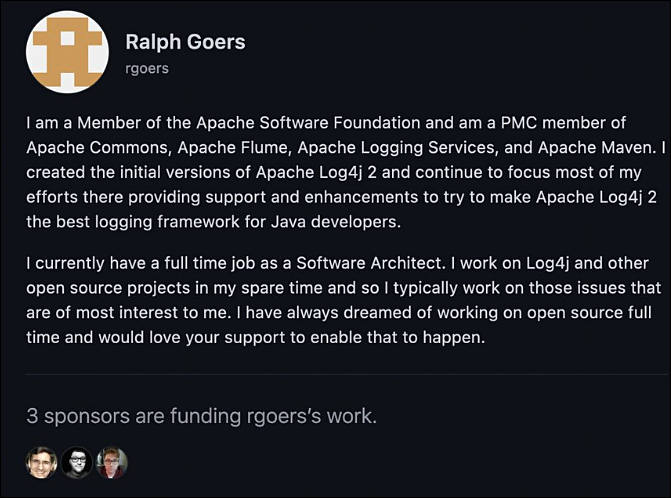
It allows to keep PV going, with more focus towards AI, but keeping be one of the few truly independent places.
-
This is the maintainer who fixed the vulnerability that's causing millions(++?) of dollars of damage.
"I work on Log4j in my spare time"
"always dreamed of working on open source full time"
"3 sponsors are funding @rgoers's work: Michael, Glenn, Matt"It is not a joke.


 sa19215.jpg671 x 498 - 58K
sa19215.jpg671 x 498 - 58K -
Most maintainers fall in one of two categories: volunteers or big company employees. Sometimes both. Neither model is healthy.
Volunteers are doing their best in their spare time out of passion, or because they are (or were) having fun. They feel tremendous responsibility, but ultimately can't be expected to persevere in the face of burnout, a change in life circumstances (like, having a kid or changing jobs), or even shifting priorities. They also can't be expected to provide professional levels of performance because, again, no one is paying them and they are well within their rights to do only the fun parts of the "job". Professionals are expensive for a reason.
GitHub Sponsors and Patreon are a nice way to show gratitude, but they are an extremely unserious compensation structure. The average maintainer of a successful project would qualify as a Senior Software Engineer, and those can easily make $150k–300k+/year. (90th percentile of SWE salaries, all levels: $355k in NYC, $232k in London, $163k in Berlin. Note that these are low-balls if you negotiate, especially in 2021/2022, and remote positions exist. Read some Patrick McKenzie.) When is the last time you've seen a GitHub Sponsors recipient making more than $1,000/month? That's at least 12 times less than the alternative.
Even more importantly, there isn't a career path. You can't start as a junior maintainer, get training and experience, and expect to eventually grow into a better paid senior maintainer. That's not how any of it works today.
Being employed as a full-time maintainer by a big company pays better but is not much healthier, both organizationally and individually. Executives and promotion committees start asking "what is it that we pay you for exactly?", and suddenly you're spending more and more time proving your work is important, and less and less time doing it. The workload increases as the project grows, but the team struggles to get more resources, no one gets promoted, and people burn out and leave or change roles. I've seen this play out across multiple companies and ecosystems, over and over.
-
Bleeping Computer dug up one of Squires’ posts on GitHub from November 2020, in which he declares he no longer wants to do free work. “Respectfully, I am no longer going to support Fortune 500s (and other smaller sized companies) with my free work,” he says. “Take this as an opportunity to send me a six figure yearly contract or fork the project and have someone else work on it.”
Howdy, Stranger!
It looks like you're new here. If you want to get involved, click one of these buttons!
Categories
- Topics List23,993
- Blog5,725
- General and News1,354
- Hacks and Patches1,153
- ↳ Top Settings33
- ↳ Beginners256
- ↳ Archives402
- ↳ Hacks News and Development56
- Cameras2,368
- ↳ Panasonic995
- ↳ Canon118
- ↳ Sony156
- ↳ Nikon96
- ↳ Pentax and Samsung70
- ↳ Olympus and Fujifilm102
- ↳ Compacts and Camcorders300
- ↳ Smartphones for video97
- ↳ Pro Video Cameras191
- ↳ BlackMagic and other raw cameras116
- Skill1,960
- ↳ Business and distribution66
- ↳ Preparation, scripts and legal38
- ↳ Art149
- ↳ Import, Convert, Exporting291
- ↳ Editors191
- ↳ Effects and stunts115
- ↳ Color grading197
- ↳ Sound and Music280
- ↳ Lighting96
- ↳ Software and storage tips266
- Gear5,420
- ↳ Filters, Adapters, Matte boxes344
- ↳ Lenses1,582
- ↳ Follow focus and gears93
- ↳ Sound499
- ↳ Lighting gear314
- ↳ Camera movement230
- ↳ Gimbals and copters302
- ↳ Rigs and related stuff273
- ↳ Power solutions83
- ↳ Monitors and viewfinders340
- ↳ Tripods and fluid heads139
- ↳ Storage286
- ↳ Computers and studio gear560
- ↳ VR and 3D248
- Showcase1,859
- Marketplace2,834
- Offtopic1,320




